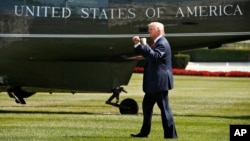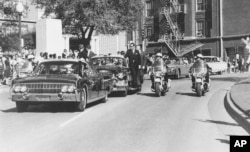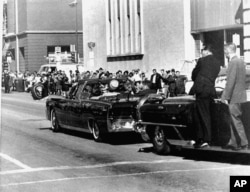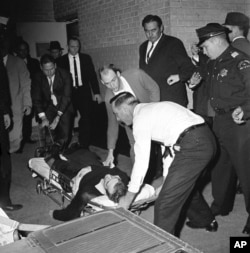President Donald Trump is heading to Dallas on the eve of the deadline for release of a final batch of documents that could shed more light on that Texas city’s darkest moment.
The trip is ostensibly for a fundraiser expected to raise more than $4 million for Texas Republicans.
But it coincides with a deadline set by Congress for the release of all material relating to the assassination of President John F. Kennedy almost 54 years ago. By law, Trump has authority to decide whether any of the material should remain secret after October 26, but he has indicated he would allow everything to be made public.
White House Press Secretary Sarah Sanders confirmed to VOA that Trump would be speaking at the fundraiser, but declined to say whether he would address the records issue. A local TV station reported that tickets for the fundraiser started at $2,700 and a photo with the president would cost $35,000.
The documents due for release Thursday comprise more than five million pages of records related to Kennedy's murder on Nov. 22, 1963, in Dallas, including photos, sound and video recordings and artifacts in the possession of the National Archives. But that’s a tiny fraction of the trove of documents held by the Archives.
Officials say 88 percent of the records have been fully public for decades, another 11 percent are in the public domain, but were redacted to black out names and other sensitive information that will now be revealed. Only one percent has never been seen.
U.S. District Judge John Tunheim, who headed the independent Assassination Records Review Board, says most of the files still under wraps were considered irrelevant to the assassination. Tunheim predicts there will be very little new in the final batch.
“There really wasn’t very much that we ended up protecting,” Tunheim said in a VOA interview. “So I don’t think this is a large trove of evidence that people are going to be really excited about.”
Scholars and conspiracy theorists appear most eager to see documents relating to assassin Lee Harvey Oswald’s contacts with foreign governments, in particular a trip he made to Mexico City in the weeks before the shooting when he visited the Cuban and Soviet embassies.
Protection of sources and methods
Tunheim says those files were held back because they revealed sensitive intelligence sources and methods.
“The State Department and the CIA convinced us that if we released the details of the intelligence sharing arrangement with the Mexican government that it was likely to bring down the Mexican government at the time because the same party was in charge of the government,” Tunheim explained. “I don’t know if that was true or not, but we wound up protecting those details.”
Tunheim, who is currently chief judge of the U.S. District Court for Minnesota, says it is important that the American public know that absolutely everything about the assassination is out in the open, “even if it might incidentally reveal some long ago intelligence gathering methods.”
He told VOA he doubts the release will put to rest the conspiracy theories that continue to surround the Kennedy assassination. “It’s so engrained in Americans’ minds that there must have been a conspiracy; that this 24-year-old loser couldn’t have done this on his own,” he said.
“I think the problem is there were a lot of holes in the original investigation. The quick killing of Oswald ended a lot of opportunity to really learn what was actually going on.”
Tunheim says the growing public distrust of government ensures that doubts about Kennedy’s killing will live on alongside the pantheon of conspiracy theories surrounding the murder of President Abraham Lincoln.
“When I was chair of the review board I did a number of radio call-in shows and virtually every time someone called in and said, “This is really interesting, but I really want to talk about the Lincoln assassination and what happened to [Lincoln’s assassin] John Wilkes Booth,” Tunheim said.
“So it’s likely 100 years from now people will say, ‘We haven’t gotten to the bottom of what really happened.”
Dan Mahaffee, vice-president and director of policy at Washington’s Center for the Study of the Presidency and Congress, told VOA he worries that America has entered an “era of conspiracy theories” spurred by the loss of faith in government.
“The way that the early sixties, the promise of a new generation of leadership, being cut down by that assassin’s bullet, and then moving to that era of Vietnam, of racial tensions, and then breakdown in trust in government, be it the Pentagon Papers or Watergate; really at that moment you can write a story about how the American people began to lose faith in institutions, and became focused on cultural wars, the displacement in society, and those rifts in society from Vietnam onwards now endure to this day,” Mahafee said.







